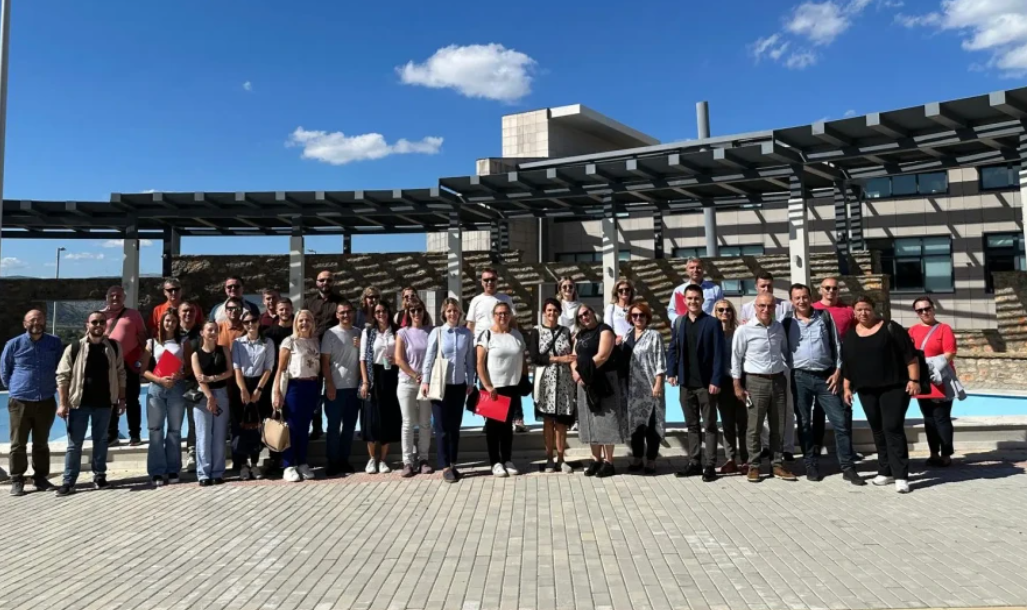At the end of September, the Belgrade Open School, in collaboration with partner organizations, organized a study visit to Greece. The delegation consisted of 40 representatives from civil society organizations, the academic community, the media, and experts engaged in the field of energy transition. The purpose of the visit was for participants to gain firsthand insight into the ongoing energy transition process in Greece, with a focus on the issue of a just transition.
Over the course of three days, we visited Thessaloniki, Kassandra, and Kozani. Our hosts were the organization "Green Tank," the women’s energy cooperative "WEnCoop" from Thessaloniki, as well as the University of Western Macedonia in Kozani. We had the opportunity to attend lectures, participate in field visits, and engage in discussions with experts, representatives of the business and academic communities. Throughout these activities, we learned how the process of a just transition is carried out and initiated by non-state actors. The following is a report on the study visit, prepared for the UNA television and portal by one of the participants, journalist Srđan Ristić.
UNA'S VISIT TO A FASCINATING SOLAR POWER PLANT IN GREECE: HERE'S HOW 60 WOMEN ARE LEADING THE COUNTRY INTO THE FUTURE
Our goal was to bring together female entrepreneurs, and our vision is for as many of us as possible to get involved in Greece's energy transition, said Katerina Gani.
To stop and slow down climate change, but most importantly for cleaner air and better living conditions, it is essential to shift to renewable energy sources and stop using fossil fuels. This is exactly the direction Greece is heading, as reported by Srđan Ristić, a meteorologist from UNA TV, who visited the country.
The study tour gathered experts, civil society organizations, and academics. The first stop was Thessaloniki. The goal was to uncover Greece's secret how they are transitioning from lignite to solar and wind energy. Greek scientists emphasize that the key is determining when to stop using coal.
"The pivotal year for Greece's energy transition was 2019, when it was decided that we would phase out coal by 2028 at the latest. The latest coal plant, Ptolemaida 5, will be closed within the next two years," said Joana Teodosiu from "The Green Tank."
A crucial part of the energy transition and the fight to reduce greenhouse gas emissions by 55% by 2030 (compared to early 21st-century levels) involves groups of individuals and cooperatives. In Greece, there are around 1,700 such cooperatives, and one of them is special because it consists solely of women.
Many people in Greece thought that women could never achieve this. The idea of 60 women founding a cooperative and opening a solar power plant was considered insane by many. But UNA TV's meteorologist visited exactly that— a 1 MW solar power plant, which is constantly expanding both in terms of panel area and the number of women involved.
The women expect to recover their investment in 6 years and start making a profit afterward. The annual revenue from this plant is, believe it or not, about 100,000 euros.
"This is our first photovoltaic plant in Halkidiki with a capacity of 1 MW. The goal was to bring together female entrepreneurs. Our vision is to have more of us involved in Greece's energy sector. The message to everyone is, if you want to do something, do it, because you can," emphasized Katerina Gani, director of the WEnCoop energy community.
Located just under two hours north of Thessaloniki, the unique town of Kozani is known for its lignite mines and being home to the largest coal-fired power plant in the country. However, it is now in the process of closing down its coal plants and opening solar power plants. The University of Western Macedonia in Kozani welcomed us to explore the details of this incredible transition.
"At one time, this region had 15 coal-fired power plants, but now only two are active, and they will soon be shut down. Ten years ago, this region produced 60% of Greece's energy from coal, now it is only 5%. On the other hand, we now produce a quarter of the country's total energy from the sun," said Georgios Panaras, professor of energy at the University of Western Macedonia.
The university’s laboratory is equipped with state-of-the-art instruments for monitoring air quality. Since the shift from dirty to clean energy sources, they have noticed a dramatic improvement.
"The air quality is much better since the coal plants were shut down. The number of aerosols has decreased significantly. There are still particulate matter (PM) particles, but they are below the limit. We want them to be even fewer, as they are harmful to health. With renewable energy, things will continue to improve," said Eftimis Tagaris, director of the laboratory.
The study visit was organized by the German development and environmental protection organization, Germanwatch, in collaboration with the Belgrade Open School and the Faculty of Economics, Finance, and Administration.
"Our goal was for our partners in Greece, in Thessaloniki and Kozani, to see and hear firsthand that the energy transition process can be initiated by individuals and organizations that are not part of the government. We are in a country that is not far from us, but in terms of the energy transition, it has definitely made progress," concluded Ognjan Pantić from the Belgrade Open School.
To say that the largest coal power plant will be closed by 2028 in any country is unfortunately an abstract concept for many nations in the region. However, the conclusion remains that each of us can make a difference. You’ve heard that an investment in solar panels could be returned in 6 years. The lifespan of the panels is about 25 years, so you can do the math on the long-term benefits.

 381 60 30 65 800
381 60 30 65 800






